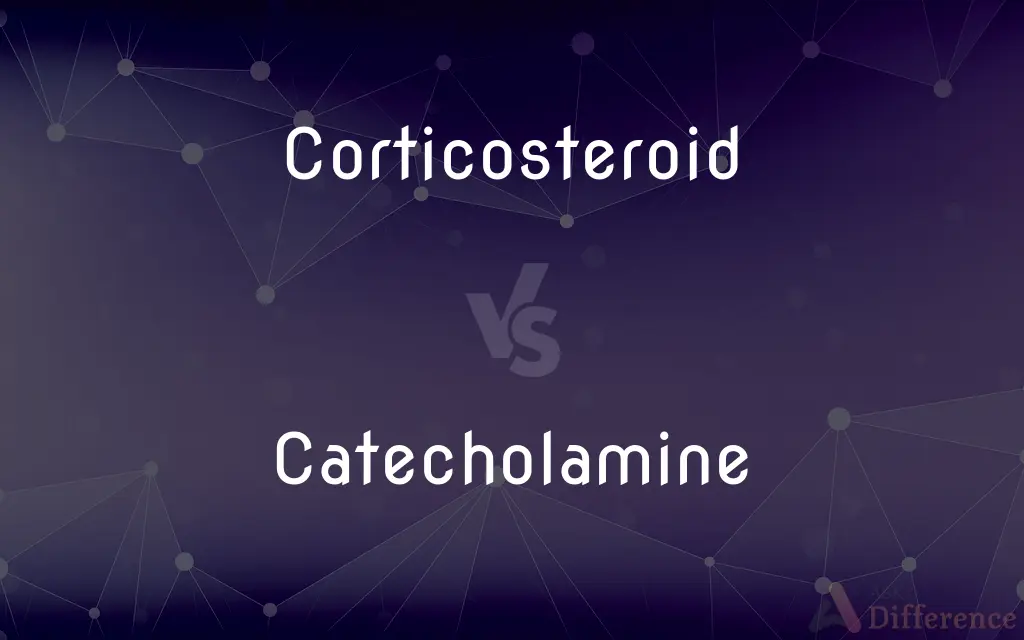Corticosteroid vs. Catecholamine — What's the Difference?
By Fiza Rafique & Maham Liaqat — Updated on May 7, 2024
Corticosteroids are a class of steroid hormones that regulate inflammation and immune responses, while catecholamines are neurotransmitters that manage stress responses and vital functions.

Difference Between Corticosteroid and Catecholamine
Table of Contents
ADVERTISEMENT
Key Differences
Corticosteroids, like cortisol, are steroid hormones produced by the adrenal cortex and are crucial in managing inflammation, immune responses, and metabolism. They are often synthesized as medications to treat conditions such as asthma and rheumatoid arthritis.
Catecholamines, such as adrenaline and noradrenaline, are neurotransmitters and hormones produced by the adrenal medulla and nervous system, primarily involved in the body's acute stress responses, including the 'fight or flight' mechanism, heart rate, and blood pressure regulation.
While corticosteroids are used therapeutically to suppress inflammation and modify immune system activity, catecholamines are often involved in emergency medical situations to manage heart rate, and critical life-saving interventions.
For example, corticosteroids might be prescribed for long-term disease management, whereas catecholamines can be administered in acute situations to rapidly adjust physiological functions.
Comparison Chart
Definition
Steroid hormones that regulate inflammation and immune function
Neurotransmitters involved in stress response
ADVERTISEMENT
Production Site
Adrenal cortex
Adrenal medulla and nervous system
Usage in Medicine
Treat chronic inflammatory diseases, autoimmune disorders
Emergency response, treat cardiac arrest, anaphylaxis
Example
Cortisol, prednisone
Adrenaline (epinephrine), noradrenaline (norepinephrine)
Compare with Definitions
Corticosteroid
Can suppress the immune system.
Patients receiving corticosteroids may have a higher risk of infections.
Catecholamine
Act as neurotransmitters and hormones.
Adrenaline is a catecholamine that increases heart rate during stress.
Corticosteroid
Used to treat allergic reactions and autoimmune diseases.
Corticosteroids can effectively manage symptoms of rheumatoid arthritis.
Catecholamine
Crucial for the 'fight or flight' response.
Catecholamines rush through the body when facing a threat.
Corticosteroid
Involved in metabolism regulation.
Corticosteroids influence how the body utilizes fats, proteins, and carbohydrates.
Catecholamine
Used in emergency medicine.
Epinephrine injections are used to treat severe allergic reactions.
Corticosteroid
Hormones that modulate inflammation and immunity.
Prednisone is a synthetic corticosteroid used to reduce inflammation.
Catecholamine
Produced in response to stress.
Physical or emotional stress can trigger catecholamine release.
Corticosteroid
Often administered as pills or injections.
Corticosteroid injections are commonly used for severe arthritis pain.
Catecholamine
A catecholamine (; abbreviated CA) is a monoamine neurotransmitter, an organic compound that has a catechol (benzene with two hydroxyl side groups next to each other) and a side-chain amine.Catechol can be either a free molecule or a substituent of a larger molecule, where it represents a 1,2-dihydroxybenzene group. Catecholamines are derived from the amino acid tyrosine, which is derived from dietary sources as well as synthesis from phenylalanine.
Corticosteroid
Any of a group of steroid hormones produced in the adrenal cortex or made synthetically. There are two kinds: glucocorticoids and mineralocorticoids. They have various metabolic functions and some are used to treat inflammation.
Catecholamine
Any of a group of monoamines, including epinephrine, norepinephrine, and dopamine, that act as neurotransmitters and hormones.
Corticosteroid
Any of the steroid hormones produced by the adrenal cortex or their synthetic equivalents, including the glucocorticoids, such as cortisol, and the mineralocorticoids, such as aldosterone. Also called adrenocorticosteroid.
Catecholamine
(biochemistry) Any of a class of aromatic amines derived from pyrocatechol that are hormones produced by the adrenal gland.
Corticosteroid
(steroid hormone) Any of a group of steroid hormones, secreted by the adrenal cortex, that are involved in a large range of physiological systems.
Catecholamine
Any of a group of chemicals including epinephrine and norepinephrine that are produced in the medulla of the adrenal gland. They function as nerotransmitters in the sympathetic nervous system. Also, any structurally related chemical substance, whether natural or synthetic.
Corticosteroid
Any of several synthetic hormones of related structure.
Catecholamine
Any of a group of chemicals including epinephrine and norepinephrine that are produced in the medulla of the adrenal gland
Corticosteroid
A steroid compound produced by the adrenal cortex, or a synthetic analog of such a compound.
Corticosteroid
A steroid hormone produced by the adrenal cortex or synthesized; administered as drugs they reduce swelling and decrease the body's immune response;
Adrenal cortical steroids are used to treat many different conditions
Common Curiosities
Can corticosteroids affect mood?
Yes, long-term use can affect mood and cause emotional instability.
Why are corticosteroids used in asthma treatment?
They reduce airway inflammation, which is a key factor in asthma.
What are common side effects of catecholamines?
They can cause palpitations, anxiety, and heart problems.
What are the main roles of corticosteroids in the body?
They regulate inflammation, immune responses, and metabolism.
How do catecholamines respond to stress?
They prepare the body for acute stress by triggering the 'fight or flight' response.
How are catecholamines administered in medical settings?
They are often given intravenously in acute care settings for immediate effects.
What is the difference in administration between corticosteroids and catecholamines?
Corticosteroids are often administered orally or via injection, while catecholamines are usually given intravenously in emergencies.
How do corticosteroids and catecholamines affect heart health?
Corticosteroids indirectly affect heart health through fluid balance and metabolic changes, while catecholamines directly increase heart rate and force of contraction.
What diseases are treated with corticosteroids?
Conditions like lupus, multiple sclerosis, and chronic asthma are treated with corticosteroids.
Can catecholamines be used to treat heart conditions?
Yes, they can be used to treat conditions like heart failure or cardiac arrest to improve heart function.
Share Your Discovery

Previous Comparison
Groove vs. Sulcus
Next Comparison
Zither vs. LuteAuthor Spotlight
Written by
Fiza RafiqueFiza Rafique is a skilled content writer at AskDifference.com, where she meticulously refines and enhances written pieces. Drawing from her vast editorial expertise, Fiza ensures clarity, accuracy, and precision in every article. Passionate about language, she continually seeks to elevate the quality of content for readers worldwide.
Co-written by
Maham Liaqat















































